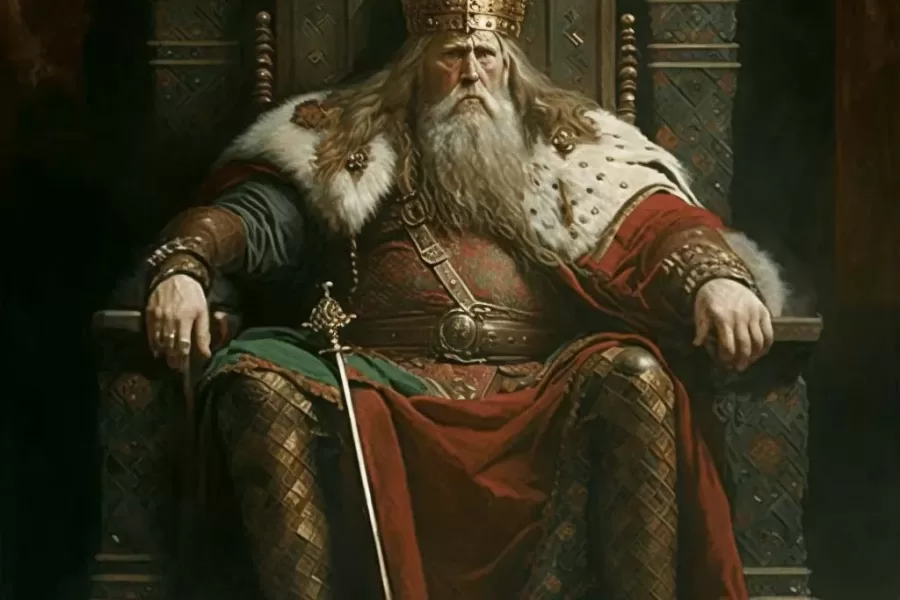Brian Boru is a legendary figure in Irish history. He is widely regarded as one of the greatest leaders the country has ever produced. He was born in 941 AD and rose to become the High King of Ireland. Brian ruled over the country from 1002 until his death in 1014.
| Early Life | Victories | Alliances | Achievements |
Brian’s reign was marked by military victories, political alliances, and cultural achievements. This made him one of the most significant figures in Irish history. We will explore the life and legacy of Brian Boru, from his early years to his final battle at Clontarf.
Early Life and Rise to Power
Brian Boru was born in 941 AD in Killaloe, County Clare, Ireland. He was the youngest son of Cennétig mac Lorcain, a local chieftain, and his wife Bé Binn inis, who was said to have been a woman of great beauty and wisdom. From an early age, Brian displayed a talent for leadership and was seen as a potential future king.
Brian’s first significant experience of battle came in 964 AD when he fought alongside his brother, Mahon, in a battle against the Vikings. The brothers were victorious, and the battle helped to establish their reputation as capable warriors and leaders. However, their victory also drew the attention of their enemies, and they were subsequently captured and imprisoned by the Vikings.
Brian spent several years in captivity, during which time he learned about the Viking way of life and military tactics. He also gained a reputation for his courage and resourcefulness, and eventually, he was able to escape with the help of a sympathetic guard. Brian returned to his homeland and began to gather support for his bid to become High King of Ireland.
In 1002 AD, after a series of military victories and political alliances, Brian was crowned High King of Ireland at the age of 61. He was the first king to unite all of the major Irish kingdoms under a single ruler. His reign marked a significant turning point in Irish history.
Military Victories
Brian Boru’s reign was marked by several significant military victories, which helped to cement his reputation as a skilled military leader. One of his earliest victories came in 1004 AD when he led an army against the Vikings at the Battle of Glenmama. Brian’s army was vastly outnumbered, but he was able to outmaneuver his opponents and inflict a significant defeat on them.
In 1013 AD, the Vikings launched a massive invasion of Ireland, with a force of around 10,000 men. Brian responded by assembling an army of his own and marching to meet the invaders. The two sides met at the Battle of Clontarf in April 1014. This would become one of the most significant battles in Irish history.
The battle was a hard-fought affair, with both sides suffering heavy losses. Brian himself fought in the front lines, wielding a battle-axe and inspiring his troops with his bravery and determination. In the end, Brian’s army emerged victorious, and the Vikings were forced to withdraw.
However, Brian himself was not to live to see the full fruits of his victory. As the battle was drawing to a close, a group of fleeing Vikings spotted Brian and his bodyguards resting in his tent. They launched a surprise attack, and in the ensuing chaos, Brian was killed.
Political Alliances
Brian Boru was not only a skilled military leader but also a shrewd politician who was able to form alliances with other powerful Irish rulers. One of his most significant allies was Máel Sechnaill mac Domnaill, the king of Meath, who helped Brian to secure his position as High King of Ireland.
Brian also formed alliances with several other Irish kings, including the king of Munster, Donnchad mac Briain, who was his own nephew. Through these alliances, Brian was able to establish a level of stability and unity in Ireland that had not been seen before.
In addition to his alliances with Irish rulers, Brian also established diplomatic relations with foreign powers. He sent ambassadors to the court of the Holy Roman Emperor, Henry II, and formed an alliance with the king of Scotland, Malcolm II. These diplomatic efforts helped to enhance Brian’s status as a respected leader, both at home and abroad.
Cultural Achievements
Brian Boru’s reign was not just marked by military and political achievements, but also by significant cultural advancements. He was a patron of the arts and supported the development of Irish literature, music, and art.
Brian was known to have been a skilled harpist, and he encouraged the development of harp music in Ireland. He is said to have established a school of harpists at his court in Kincora, which helped to foster a thriving musical culture in Ireland.
Brian also supported the development of Irish literature, and his reign is associated with the golden age of Irish literature. Many of the most famous Irish texts, such as the Book of Leinster and the Book of Armagh, were written during Brian’s reign.
Brian Boru’s Legacy
Brian Boru’s legacy is still felt in Ireland today, more than a thousand years after his death. He is regarded as a symbol of Irish unity and strength. His name is associated with the idea of a united Ireland.
In the centuries following his death, Brian’s legend grew, and he became a mythical figure in Irish folklore. He is often depicted as a heroic warrior-king, fighting against the forces of darkness and tyranny.
In the 19th and early 20th centuries, the idea of Brian Boru as a symbol of Irish nationalism became increasingly popular. He was seen as a figure who embodied the spirit of Irish resistance to foreign rule. His image was used to inspire Irish independence movements.
Today, Brian Boru’s legacy is still celebrated in Ireland, with festivals and events held in his honor. His name is also commemorated in numerous place names, such as the town of Killaloe, where he was born.
Conclusion
Brian Boru was one of the most significant figures in Irish history. A skilled military leader, shrewd politician, and patron of the arts. His reign marked a turning point in Irish history, as he united the major Irish kingdoms under a single ruler and established a level of stability and unity that had not been seen before.
Although his reign was cut short by his death at the Battle of Clontarf, Brian’s legacy has endured. He is still celebrated as a symbol of Irish strength and unity. His story is a testament to the resilience and spirit of the Irish people, and his name will always be associated with the idea of a united Ireland.
Recommended Reading
- “Brian Boru: Battle for Ireland” by Morgan Llywelyn
- “Brian Boru: Ireland’s Greatest King?” by Máire Ní Mhaonaigh
- “Brian Boru: Ireland’s Warrior King” by Damien Goodfellow
- “Brian Boru: The Warrior King” by John Burke
- “Brian Boru: The Battle for Clontarf” by Sean Duffy







